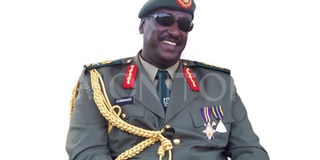Prime
Gen Salim Saleh shot at 18 times in Luweero jungles

Gen Salim Saleh, aka Caleb Akandwanaho. PHOTO/FILE
What you need to know:
- When intelligence about the location of UNLA forces was gathered, NRA planned the attack.
- The chairman of the High Command, Yoweri Museveni, chose his brother Salim Saleh to lead the battle. Saleh commanded the Mobile Brigade, which had the best trained fighters at the time.
On February 20, 1983, at Bukalabi village, then in Luweero but now in Nakaseke District, Gen Salim Saleh, aka Caleb Akandwanaho, survived death after a volley of bullets were shot at him by Uganda National Liberation Army (UNLA) soldiers.
For hours, UNLA and the National Resistance Army (NRA) rebels fought the fierce battle to take control of the strategic location. Bukalabi was important because it was surrounded by a forest where NRA rebels had established their High Command. It was there that NRA rebel leader Yoweri Museveni was staying.
While UNLA won the Bukalabi battle, NRA eventually won the war in January 1986.
Preparation for Bukalabi battle
When intelligence about the location of UNLA forces was gathered, NRA planned the attack. The chairman of the High Command, Museveni, chose his brother Salim Saleh to lead the battle.
Saleh commanded the Mobile Brigade, which had the best trained fighters at the time, from which he selected about 90 fighters. He then divided his troops into six platoons, each composed of 15 fighters.
In the Mijenje forest, a final headcount was conducted to ascertain the number of his troop. Everything was well. The last brief was made and Saleh led his fighters into battle.
By 5am, Saleh and his fighters had arrived at the frontline.
Wrong intelligence
Because NRA had wrong intelligence on the exact location of the enemy forces, it was for that reason the Bukalabi battle turned out disastrous for the NRA rebels.
In an interview with NRA Veteran Year Magazine of September-November 1993, Saleh speaks about what went wrong.
“We started forming up in front of the enemy machine gun which had been hidden. We were subjected to a defensive fire exchange instead of forming up properly to counter the enemy fire,” he says.
The General said his troops tried their best to fire back at the enemy in order to break their continuous heavy fire, but to no avail.
ALSO READ: The women who fought in the bush war
Saleh mentions that the wrong intelligence was gathered by an NRA intelligence officer, Tumukunde, and other senior civilian informants.
Sunday Monitor was not able to establish whether the said officer was retired Lt Gen Henry Tumukunde, or the late Brig Benon Tumukunde.
Meanwhile, as he shouted out commands to his troops, Saleh was identified by the enemy and was subjected to a rain of bullets.
ALSO READ: Here are NRA’s top 100 fighters
It was not until he couldn’t hold his gun that Saleh realised that he had hit in both arms and lower abdomen.
Saleh shot at 18 times
“My jacket had 18 bullet holes. Only three or four got into my body. It was God’s plan. He wanted me alive,” Saleh told of his miraculous survival.
It was then that he ordered his troops to withdraw. It is said that late Paddy Kambugu carried the injured Saleh to Ddondo’s home, about two miles from the battlefield where the rebels had a sickbay. Kambugu was killed in a counterattack against the UNLA in Bukalabi.

An illustration of an NRA rebel fighter on the frontline during the 1981-1986 Bush War. Illustration/IVAN SSENYONJO
Writing about the Bukalabi battled, the late Lt Gen Pecos Kutesa in his book Uganda’s Revolution 1979-1986: How I saw it on page 150 says: “The Bukalabi attack was a disaster for us because we were not used to such heavy casualties… even commander Fred Rwigyema broke down and wept when he saw the wounded Saleh.”
Miraculously, 24 hours after he was injured, Saleh was making steady recovery and three months later he was back to the frontline. No exact number of the dead from both sides has been documented, although it said NRA lost at least 10 fighters.
View...Battle to remember:
“I was there and I was the officer in-charge. It is the battle I will never forget in my military career – leaving behind several wounded in the battlefield. That was very bad. It was painful because it was the first time we left our dead in the battlefield,” Saleh speaking to Sunday Vision on September 16, 2012.




